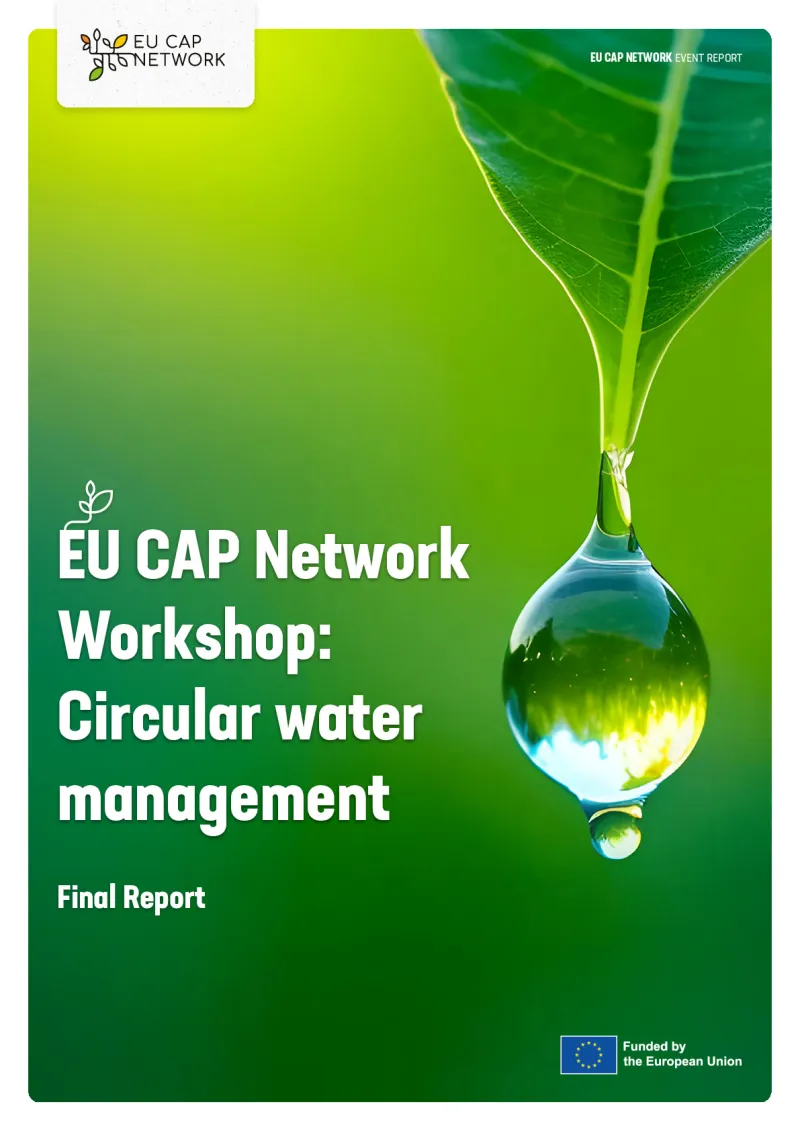EU CAP Network Workshop ‘Circular water management’
- Innovation, knowledge exchange & EIP-AGRI
- Agricultural Productivity
- Climate and Climate Change
- Fostering Knowledge & Innovation
This report presents the main results of the EU CAP Network Workshop ‘Circular water management’, which was held on Tuesday 12 and Wednesday 13 March 2024 in Seville, Spain.
- 2023-2027


The competitiveness and resilience of the farming sector depend heavily on the availability and quality of natural resources such as soil, nutrients, water, and biodiversity. Water is arguably the most critical input for crop production, and its management in agricultural systems has direct consequences on the surrounding environment and the overall water balance at the basin level. Plant water status is a key determinant of biomass production, making the optimisation of soil water availability a primary goal for farmers.
On average, irrigation accounts for 24% of water abstractions in the EU, with significant regional and seasonal variations. In southern European countries, irrigation can account for up to 60-70% of abstracted water, while in some Northern European regions, this percentage can reach 30% during the summer. These variations highlight the challenges linked to the unsustainable management of water resources in agriculture, particularly regarding over-abstraction.
Natural resources are under increasing pressure from environmental variations linked to climate change, groundwater depletion, soil erosion and desertification challenges, to which agriculture also contributes. There is growing evidence of the negative effects of climate change-induced shifts in precipitation and temperature on water availability for agriculture, with significant impacts on food production (IPCC 2023). As a highly water-dependent sector, agriculture will be severely affected by these changes, facing growing challenges with water scarcity. The productivity of both rain-fed and irrigated crop production in many regions is at risk, with potential consequences for food security and the economic sustainability of the farming sector.
In many areas, increasing irrigated land is not feasible due to current water resource limitations, as well as the technical difficulties and high costs associated with providing and installing the necessary water infrastructure, both on-farm and from the water source to the farm gate. Therefore, it is essential to explore more nature-based and sustainable solutions to enhance a farm’s capacity to store more water in the soil, as well as to capture and treat water runoff and discharges from the surrounding environment. This includes water from farm fields, roofs, greenhouses, farm activities such as livestock operations and primary processing, and small-scale agri-food industries.
In this context, the EU CAP Network workshop ‘Circular water management’ was held in Seville, Spain, on 12-13 March 2024, bringing together 83 participants. Farmers, advisors, researchers, entrepreneurs, and other relevant stakeholders shared knowledge and practical experiences related to innovative projects and solutions for circular water management, with the goal of applying these practices throughout the European Union. Read more about the presentations, activities, field visits, conclusions and more in this event report.
Author(s)
EU CAP Network
